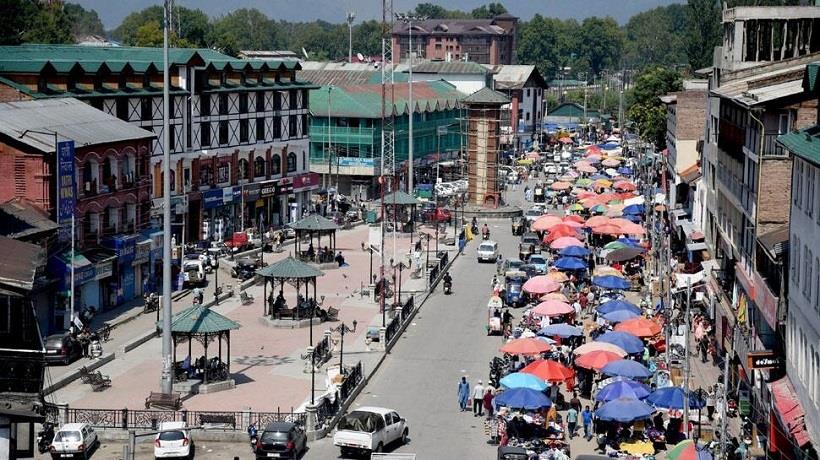
Trouble In Kashmir's Trade Heartland
File Photo
By Mehren Baba
Hilal Ahmad can't shake the feeling of being jobless despite running a garment store in Lal Chowk. His tribe has served customers for decades, but now they're losing their livelihoods. If this trend continues, Hilal fears, Lal Chowk may soon become a shadow of its past.
Before the COVID-19 pandemic, Hilal had two employees and a stable clientele. But when the lockdowns hit, his business was badly affected. Just as things began to recover, the Smart City project brought a new set of challenges. Constant road construction and barricades outside his shop reduced footfall drastically.“Even if someone wanted to come, the dust and blocked roads kept them away,” he said.
Then came the flood of online sellers-many of them unregistered, selling cheaper and often unauthentic products through Instagram and Facebook.“They don't pay taxes or rent, yet sell at low prices. People think they're getting a deal, but they don't realize the hidden costs,” Hilal explained.
To make things worse, the closure of Sumo services a couple of years ago cut off a significant portion of daily shoppers who used to travel from nearby areas. Now, Hilal sits idle most of the day, seeing a maximum of six to seven customers-on a good day.
Read Also Markets Abuzz As Eid Shopping Frenzy Grips Srinagar People Concerned Over Skyrocketing Prices Of EssentialsWith no choice, he had to let go of his employees.“Now I handle everything myself, but the expenses keep piling up-shop rent, electricity, school fees for my children, medical bills for my parents, and daily needs for my family,” he said.“On top of that, I still have to pay taxes, EMIs, and debts to suppliers.”
The weight of this pressure has gone beyond financial pain-it's affected his mental health.“We are not just losing income, we are losing peace of mind,” Hilal said quietly. He, like many others, has started experiencing anxiety and signs of depression.“There are people who think this is all our fault-that we used to overcharge. But they don't see the full picture. Running a shop isn't just about sales, it's about surviving after paying everyone else first,” he added.
Recently, Hilal placed his last hope in the government.“Trader associations have had meetings, but we haven't seen any change. Right now, all I have is faith in God. I pray that things get better for Kashmir.”
Shopkeepers in Lal Chowk bear heavy costs-rent, electricity, employee salaries, and taxes-while many online sellers operate without such burdens.“We have been paying taxes and following government regulations for years, but now these online pages sell the same products at lower prices without any accountability,” says Abdul Rahim, another garment shop owner in Lal Chowk.
Online sellers who avoid GST and business registration enjoy an unfair edge, drawing customers away from physical markets. COVID-19 further accelerated this trend, pushing people online while local shops bore the brunt.
According to the Centre for Monitoring Indian Economy (CMIE), Jammu & Kashmir has the highest unemployment rate in India-reaching 45.3% in December 2023. With limited job opportunities, many young Kashmiris have turned to social media to start informal businesses.
While this offers a form of self-employment, it's also deeply hurting traditional shopkeepers like Hilal who cannot compete without government support.“Earlier, I employed two workers in my shop, but now I can't afford them,” says Mohammad Yasin, a footwear seller.“They lost their jobs because business has collapsed.”
This domino-effect shows how online markets are not only affecting shopkeepers but increasing unemployment as well.
Some recent viral videos show empty markets and frustrated traders speaking about their losses. Yet, authorities have taken little action to regulate these online sellers or support those struggling in the physical market.
Many blame the changing consumer habits for the growing trouble in Kashmir's iconic trade centre. They argue that people now prefer lower prices from online sellers, the convenience of home delivery and a wider variety of options online.
Without intervention, it's said, physical shopkeepers are being pushed out of business. If this crisis is not addressed, the heart of Kashmir's economy-Lal Chowk-may not survive.“The government must ensure fair competition and regulate online sellers by registering and taxing social media businesses, and by creating policies that ensure fair pricing and accountability,” argues another Lal Chowk trader.
Local traders, the shopkeeper said, should be supported through subsidies or relief packages and must be offered digital marketing and e-commerce training.“As a welfare initiative,” he said,“government must promote hybrid models and help shopkeepers blend online and offline sales, besides given access to platforms and tools to expand reach.”
Lal Chowk is not just a market-it's a symbol of Kashmir's resilience, economy, and culture. But without action, these shops may fade away, taking with them not just livelihoods, but a way of life.
As Hilal Ahmed rightly concluded,“We can't survive just by sitting in our shops hoping to make a few hundred rupees a day. We need help before it's too late.”
- – The author is a social worker, passionate about highlighting social and economic issues.

Legal Disclaimer:
MENAFN provides the information “as is” without warranty of any kind. We do not accept any responsibility or liability for the accuracy, content, images, videos, licenses, completeness, legality, or reliability of the information contained in this article. If you have any complaints or copyright issues related to this article, kindly contact the provider above.






















Comments
No comment